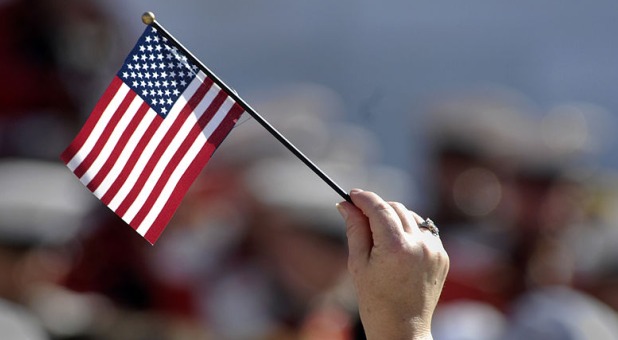Is Patriotism Christian or Idolatrous State Worship?
Christianity and patriotism can be wedded in an unhealthy union. Worship of the state is nothing less than idolatry, the exaltation of a false god that leads only to emptiness (Jeremiah 2:5).
With that acknowledged, it’s equally important to note that an informed Christian patriotism, one that always subsumes loyalty to country or party to the Lordship of Jesus Christ and acknowledges the impermanence of every government and nation, is valid not only if the object of such loyalty is an honorable entity (unlike, say, the former Soviet Union) but also desirable as a means of preserving and advancing a just society.
Blind allegiance to one’s country can lead to a totalitarian state. Esteemed political leaders can thereby be imbued with near-godlike status, pioneering forebears characterized as wholly heroic, and the nation’s heritage portrayed as an unbroken succession of grandeur and beneficence.
This kind of loyalty is dishonest. It ignores the reality that every human institution, every nation, and every person is fallen and under judgment. To quote from Frank Capra’s classic film “Meet John Doe,” there should be no debate about the fact that “the world’s been shaved by a drunken barber.” That means everyone, and every nation.
No country or people are exempted from the curse of Eden or its effects. However noble a nation’s heritage, any candid examination of its past will reveal obvious instances of failure, brokenness, hypocrisy, and wrongdoing. To write this is to indict no one other than all people at all times: We are all sons and daughters of Adam, driven from the Garden, only redeemed through Christ, not any political text or governing structure.
In some extreme cases, thoughtless patriotism can become worship of the state and even of its leaders, as today’s North Korea vividly illustrates.
Healthy patriotism is something very different: affection for and loyalty to the convictions upon which one’s nation was founded and those who fought for them; appreciation for the sacrifices and service of one’s fellow citizens; and enduring gratitude for the blessings of just laws and institutions. In the context one’s central and supreme commitment to the God of the Bible, such patriotism animates not only civic benevolence but personal virtue.
Like many Americans, my patriotism seems woven into my soul. The National Anthem often brings a clutch to my throat. My gratefulness for this amazing country grows with each passing year. It has been magnified by extensive travel in the impoverished and repressive developing world, by a mature reflection on the sacrifices of blood and treasure that have made America possible, and by the recognition that my own family – three of my grandparents were central European immigrants who arrived on our shores with virtually nothing – has been afforded astounding opportunities in this near-miraculous nation.
For Americans, informed patriotism that acknowledges the imperfections of the past and the inadequacies of every human institution while affirming the dignity, liberty, hope and opportunity inherent in our system of constitutional, representative, decentralized self-government, is a noble thing. At its root are a dedication to the biblical principles enshrined in our country’s founding, and founding documents, and thankfulness for those who have given us what we now, too often, take for granted.
The list of our national sins is painful even to consider: slavery, injustice to Native Americans, ethnic prejudice, widespread abortion-on-demand, and the denigration of personal and public morality are only some. But just as several ugly scars do not represent the entire body, neither do our national wrongs comprehensively characterize our national heritage.
We are a country whose capacity for self-correction is one of our most profound but usually unappreciated assets. For example, we have ended human enslavement and trampled laws codifying racial discrimination underfoot. Women, once severely limited in professional opportunity, are now in positions of business and political leadership of which the early suffragettes could only have dreamed. Our men and women in uniform twice in the last century saved the world from aggressive, brutal tyranny. Not to be thankful for, and humbled by, these achievements is churlish.
Completely realized justice? No. But impressive and substantial steps toward it, and a system that provides the means and opportunities for its own improvement? Indisputably, yes.
Patriotism informed by a Christian view of God, life and the world is an honorable thing. It is about love, loyalty, and thankfulness. These are Christian virtues that, held in the context of devotion to Jesus Christ and recognition of the reality of personal and national sin, inspire good citizenship and engagement in public affairs, appreciation of home, community, and nation, and a prayerful (but not uncritical) regard for one’s political leaders.
Rob Schwarzwalder is senior vice president at Family Research Council. This article originally appeared in Religion Today.















































